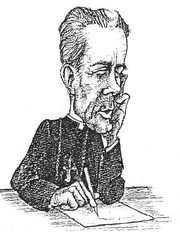
The problem of crippled authority (see these “Comments” of June 1 and 29) is rousing some lively reactions amongst readers. On the one hand valiant Catholics tell me that I AM a bishop, therefore I must ACT as a bishop by taking command of the “Resistance” movement. On the other hand a valiant priest with long experience of “sedevacantism” warns me not to let loose parallel churches by consecrating any more bishops, except in the case of World War, physical persecution or paralytic old age (well, there are those who would claim that the last has already set in...).
That is why a bishop or priest needs not only the sacramental power of his Orders, power he can never lose for all eternity, but also the power of jurisdiction, which is the power of saying (dictio) what goes, or what is right (ius, iuris). This second power does not go with his Orders, and he cannot give it to himself, he can only receive it from on high, from a Church Superior, ultimately from the Pope, and the Pope from God. Hence when valiant souls tell me that I AM a bishop (by my Orders) so that I am delinquent if I do not ACT as such by telling (dictio) the “Resistance” what to do (ius), most likely they are confusing the two distinct powers of the bishop.
However, they may be instinctively hitting upon another doctrine of the Church and of common sense, namely that of supplied jurisdiction: in an emergency where for whatever reason the Superiors are not providing the jurisdiction needed for the salvation of souls, the Church supplies it. For instance, a priest may have no jurisdiction as is normally needed to hear Confessions, but if a penitent asks him to hear his Confession, then in case of need the priest may hear it and the sacrament will be valid. Now for sure and certain the vast emergency created in the Church by Vatican II has even been aggravated by the notorious mid-April Doctrinal Declaration from SSPX HQ, which is documentary proof of the crumbling of the last standing fortress of the true Faith.
But supplied jurisdiction has a weakness, because not being official, it is much more open to dispute. For instance, Conciliar Rome denies that there is any such thing as a Church emergency created by Vatican II, and they put corresponding pressure, all too successful, on the Society of St Pius X to submit itself to Conciliar authority. Such is the need for authority to be official. Even Archbishop Lefebvre lost maybe a quarter of the priests that he ordained, because he had no power to stop them from simply walking away. Such is this unbelievable crisis of the Church. So if a priest or layman asks me to give him commands, he may himself dispute it a few months later, or as soon as he receives what he considers to be a command he need not obey.
But the crisis remains real, and it is only going to get worse until God intervenes to bring the Pope to his Catholic senses, which God will do when enough Catholics are begging him to open the Pope’s eyes. Between now and then the sharpening emergency is set fair more and more to fortify unofficial authority, but may Almighty God help us to avoid unnecessary anarchy.
Kyrie eleison.
A non-exclusive license to print out, forward by email, and/or post this article to the Internet is granted to users who wish to do so provided that no changes are made to the content so reproduced or distributed, to include the retention of this notice with any and all reproductions of content as authorized hereby. Aside from this limited, non-exclusive license, no portion of this article may be reproduced in any other form or by any other electronic or mechanical means without permission in writing from the publisher, except by a reviewer who may quote brief passages in a review, or except in cases where rights to content reproduced herein are retained by its original author(s) or other rights holder(s), and further reproduction is subject to permission otherwise granted thereby.




